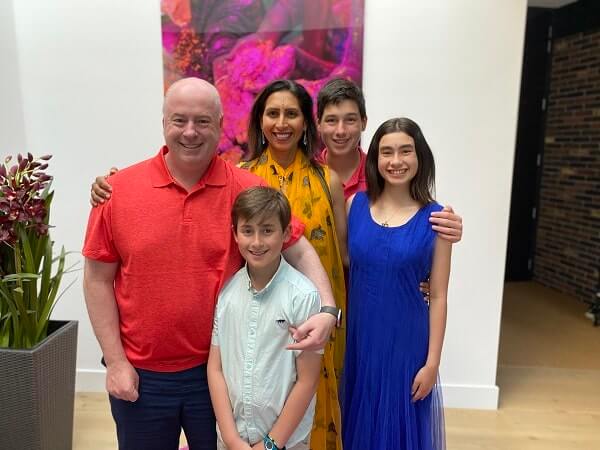As the festive season approaches, and we get ready to welcome the festival of lights, it’s a slightly different experience for mixed families, who embrace Diwali celebrations amid a flurry of many others. What do they do differently? What does Diwali mean to them? We had to find out!
Clean up, cook up: Salvin Kumar and Scott McBain
The lead up to Diwali will see two major activities taking place in the home of Sydney-based writer Salvin Kumar and his partner Scott. There’ll be a thorough spring clean of the house, followed by a massive cook up.
This year, Salvin’s making aloo poori, pumpkin curry, avial, and dosa-sambhar-chutney. A giant mithai platter will be brought in. It’s all strictly vegetarian, like every Diwali.
“Scott and I have an annual Diwali open house from 2pm to 8pm,” Salvin revealed. “We’ll put candles throughout the house, and there’ll be plenty of food. People come and go freely, sticking around to chat. Some bring presents.”
Both will be wearing new outfits they’ll have bought for the occasion – probably something Indian.
They’ll also have bought at least one new kitchen utensil. Food is an essential part of it all.
“Cooking is a large part of my identity,” Salvin revealed. “The aromas of Diwali cooking refresh my memories of Mum’s kitchen. As well, I love that food brings people together.”
These traditions come down from Salvin’s Fijian Indian family. With no immediate family around here in Australia, Salvin will be doing Diwali exactly as his family have done for years – except, of course, for the fireworks.
“On Diwali day, I’ll do a puja by myself, and then Scott will join me as I video call the family.”
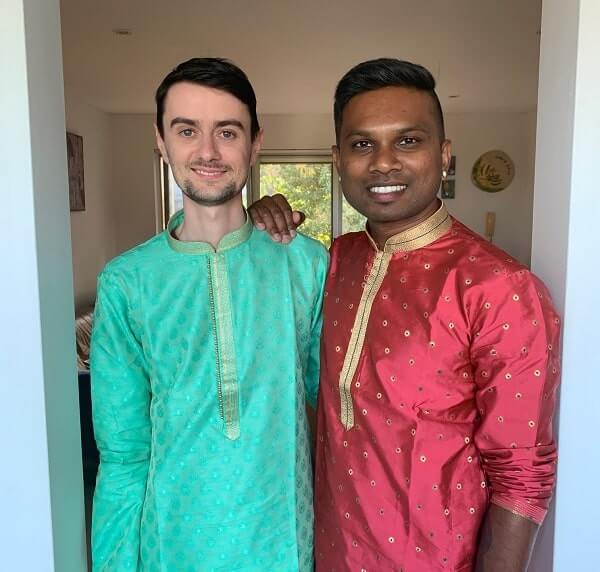
Come Christmas, Scott’s family will be at the centre of it all. “We start thinking about presents weeks before – we like to put some thought into it. We spend Christmas day with his family, open presents, have a big lunch and spend the afternoon chatting.”
Salvin and Scott have been together for four years, married for two. Conversations about their cultures grew as their relationship grew. “We were open to each other’s cultures from the beginning. He knows which days of the week I do my pujas; he’ll light the candles for me and allow me my time at prayer.”
Were there challenges, given their cultural differences?
“Between the two of us, no. If there ever was something we didn’t understand, we’d just ask each other and learn about it. It’s important to have that openness. Our families are very accommodating now, but early in the piece we faced challenges from my Indian family – same-sex marriage was a foreign concept to them even though such unions have been known in India for eons. Out here, people have looked at us differently too, I must admit. Many people assume I married Scott for a visa – even though I had my citizenship before I even met him!”
However, Salvin agrees that these challenges notwithstanding, intercultural marriages and mixed-race families go a long way in helping to break down social barriers, promote understanding and acceptance, and increase tolerance.
“We are all different individuals. Our cultures and traditions are different. Let’s respect that and include that. Let’s bring all of our separate identities to play, and savour the flavours and fragrances.”
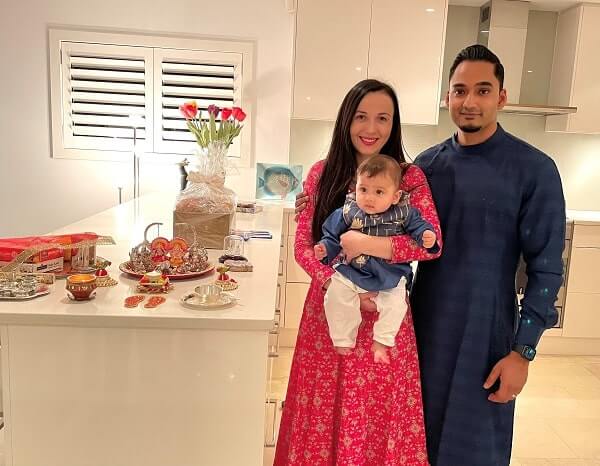
Family goals: Sanchay and Vesna Mohan
Advertising executive Sanchay Mohan and his wife Vesna see themselves as “citizens of the world”.
And so his Indian cultural traditions are just as important as her Serbian ones.
“Diwali is always spent at my parents’ place,” Sanchay described. “Vesna’s parents join in too. We wear our traditional clothes and have a meal after prayers. Easter, Christmas and Saints Day are equally significant. We’re with Vesna’s family at these celebrations.”
Their son Leroy, now 18 months old, is adding a whole new element to all of their joint celebrations. At Janmashtami not so long ago, he rocked up to a family gathering dressed in full Krishna attire, peacock feather included, much to the delight of all.
“We’re looking to do a bit more with him at Diwali – dress him up, introduce him to candles – battery operated ones of course!”
Did the young couple talk beforehand about passing on their separate cultural traditions to their children?
“We’ve been together for ten years now, and I honestly can’t remember. We just feel very much a part of each other’s family traditions, having participated from the very beginning.”
Sanchay grew up in Sydney’s North Shore, going to a school that was not very diverse, and is glad Leroy is born into a more tolerant society.
“Racism was a battle I faced on a daily basis. It wasn’t until Years 11 and 12 did the other students mature up. Luckily Leroy won’t face that, as society is so much more multicultural. Hopefully there will be less challenges for him. In saying that, wonder what his mixed heritage will mean for him in that sense… We’ll talk about it when we come to it.”
He himself was “brought up to be accepting of all people” and can boast today of social and professional circles that are hugely diverse. It is a lesson he will no doubt pass on to Leroy.
READ ALSO: And a very happy Diwali to you too, Australia Post
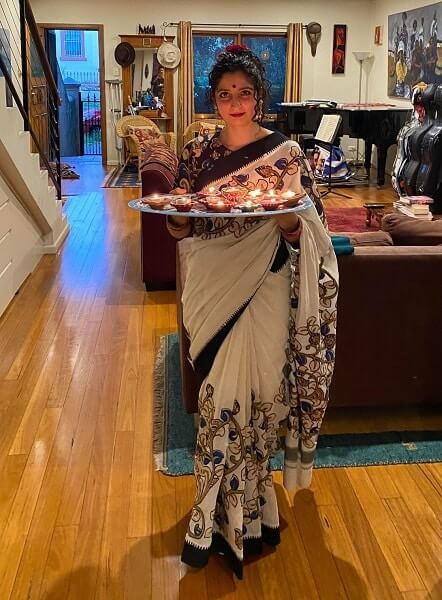
Holy bath: The Napier-Ramans
Sydney musician John Napier will received a call – or several – the morning of Diwali. They will be from members of his Indian-origin doctor wife Shanti Raman’s family. Has he had his Ganga-snaanam (holy bath), the callers will ask. A typical greeting on Diwali morning.
John would probably not have had the traditional oil bath, or worn any new clothes, or done a puja, but he knows that these are ways in which Diwali morning typically begins in the Indian side of his family.
Oh, and he probably knows that “Have you had your Ganga-snaanam” is merely a way of saying “Happy Diwali”, and does not necessarily refer to your morning ablutions.
Diwali is a special time in the Napier-Raman household, but “pretty tame” according to Shanti, as compared to the celebrations in India. Extended family will get together on the weekend, light some candles and share a meal.
Perhaps more significantly, John and Shanti will host a diverse gathering of friends including Hindus for Human Rights (HfHR-ANZ).
“We will celebrate Jashn-e-Chiraagan with poetry and music, as a reflection of cross-cultural and interfaith unity,” Shanti revealed. “We will also raise money for a deserving NGO in India dealing with vulnerable and street children based in Delhi NCR.”
And when Christmas comes around, it will be pretty much something similar, with visits arranged for members of John’s extended family who are all interstate, and gifts exchanged.
Wonder if it will be John that rings his in-laws this year, to ask if they have had their Ganga snaanam…
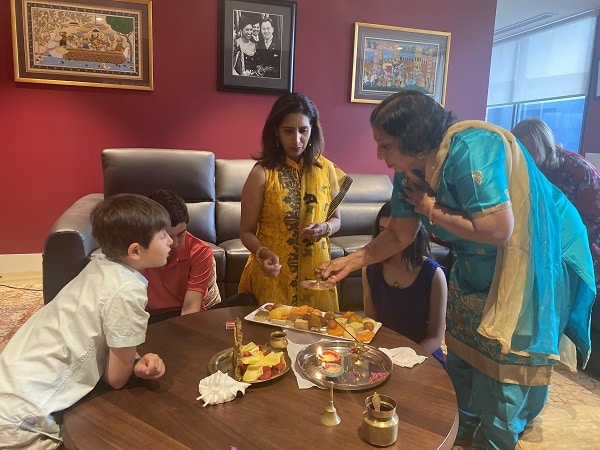
Our values, not our race: Dr Ranjana Srivastava
Diwali at oncologist Dr. Ranjana Srivastava’s Melbourne home is celebrated with just as much gusto as Christmas and Easter.
“We look forward to Diwali each year,” Dr Srivastava described. “We dress up, start the evening with a puja conducted by my mum, followed by sparklers and excessive sweets! Sometimes, the Irish-Australian side of our family joins in to multiply the fun.”
Christmas and Easter are also traditional.
“We attend Mass, sing Christmas carols and join Easter egg hunts. But I should admit that our Christmas table often features turkey alongside tandoori chicken and Christmas cake served with mango kulfi. Our bias towards Indian food is evident and proud!”
As someone who tries to live by the motto Vasudeva Kutumbakam, which means the world is one family, it is very important to Dr Srivastava that her children respect and celebrate their joint heritage.
“This comes from being respectful of each other’s traditions and taking the lead from our own parents,” she stated. “Our children love the pomp and ceremony of Indian festivals and traditions. Our festivals are such an explosion of colour – in everything from dress to food. Going to India confirms this and they feel very proud of their Indian heritage, which makes me happy!”
Are there lessons that multicultural families can teach us about living in a world that is so polarised at the moment?
“Multiculturalism is a great source of a healthy world view – that the colour of our skin or the accent of our speech does not define us as much as the values we live by. We try to embody for our children a life of integrity and hope that they will grow up to be good citizens of the world.”
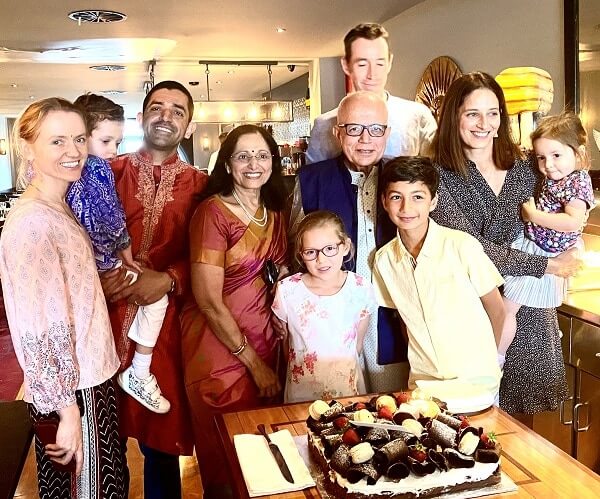
Embracing differences: Neeta and John Callagher
For Neeta and John Callagher of Sydney and their three kids, Diwali is spent with family and friends.
This is often at Neeta’s parents’ home, Tata and Tati to the grandkids.
“We light diyas and sparklers and eat sweets – Indian or otherwise,” Neeta described. The kids also manage to extract presents from Tata and Tati!”
A fond Diwali memory is gaining a furry family member.
“We named our dog ‘Sparky’ as he arrived two years ago at Diwali. So he was our Diwali present/blessing.”
Neeta and John are not particularly religious but it is important to them that their children understand, appreciate and have a healthy curiosity of their backgrounds, Indian and British/NZ.
“We teach/impart culture as much as we can via our daily behaviours and how we demonstrate relationships with our parents and extended families. Our family histories and traditions are important to both of us – we have a mutual respect for tradition but also realise that traditions can evolve and progress over time as people do. Pre-COVID we travelled to India and New Zealand as a family and hope to revisit soon.”
Have their kids embraced their dual identities?
“Our kids see themselves as Australian, as they are effectively second-generation, but they enjoy the opportunities to dress up in cultural clothes (especially my girls) at times of festive celebrations, visits to the temple, or when celebrating Harmony Day. They are proud of their mixed heritage but also see it as very normal. Both my brother and John’s brother are in mixed race relationships, so our children have essentially grown up, or are growing up, with appreciating differences in backgrounds.”
As well, their diverse social environment, with schools being a melting pot of different cultures and races, has helped them appreciate and embrace differences, Neeta added.
READ ALSO: What I miss and what I won’t this COVID Diwali
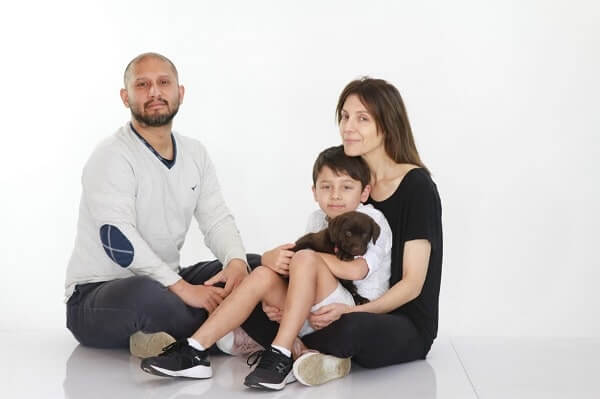
More community events please: Frances and Seuj Baruah
For Melbourne’s Frances Baruah, Diwali is not as important as Bihu, the festival celebrated in Assam, from where her husband Seuj hails.
“We do message my husband’s family for Diwali to let them know we remember this celebration and are thinking of them although so far away,” she told Indian Link, but they make a real effort at Bihu.
“We ensure every year when we visit Assam post-Christmas, that we stay until Bihu is over,” she described. “This is not only important to acknowledge this significant festival, but it also means a lot to all my husband’s family.”
The Baruahs are also keen for their son to be educated on what Bihu means and why it is so important.
“The Assamese community in Victoria organise Bihu functions where we get to experience the tradition of food, dance, music and Assamese attire to celebrate. These celebrations are not only keeping the tradition alive but also so much fun and brings everyone together.”
She recognises that aspects of her own culture will be passed on to her son by default, as they live in Australia where her traditions are celebrated by the majority and highlighted in the media and in schools etc.
“My husband’s cultural celebrations require a little more effort, as they are only celebrated by the Indian community. We would take our little one along to the community events, although he would invariably end up falling asleep and missing most of the evening! We want Bihu in particular to be familiar to him and know that one day he would be able to enjoy this celebration without sleeping throughout.”
Their son, now 10 years old, will proudly tell people he is of many mixed races.
“He’ll say I’m Indian, Greek, Russian and Ukrainian. We have always reminded him of his background and just how lucky he is to be so multicultural.”
Frances herself has a diverse background, and her siblings both have partners from different backgrounds. As such, she identifies the many cognitive advantages that being mixed race brings.
These include being adaptable, confident in membership of a number of different groups, and rejecting of the notion that race predicts one’s abilities.
At this stage though in her young family, it is the ‘bringing everyone together’ aspect of her wildly intercultural family that appeals most – the ability to see connections between people over and beyond what they look like.
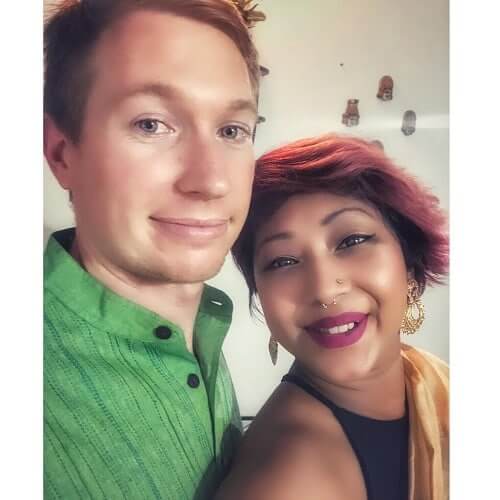
Gentle Diwali: Ipshita and Liam Collins
Melb-based Ipshita Collins loves Diwali for the lights and diyas and the food.
She’s not a big fan of the firecrackers though.
“I used to live in Delhi, and the smoke would invariably trigger my asthma,” Ipshita revealed. “The noise bothered me as well.”
It’s different story though, with her husband Liam.
“He on the other hand, would turn into a child, bursting crackers to the wee hours and loving every minute!”
Much like him, his family are “keen on everything Indian,” according to Ipshita.
“More than me, sometimes,” she laughed. “Nobody really talks about our ‘cultural differences’. I get the occasional question about how things are done back home, that’s about it.”
While family may have embraced Ipshita for who she is, others have certain expectations because she is Indian.
“I’ve met some people who are surprised that I speak English really well. That I have coloured hair and piercings. That I don’t cook Indian food all the time. My in-laws are farmers, and through them I’ve met people who have never had a conversation with an Indian person before. They have all these notions in their head about how people from India sound like, look like, behave or eat. What’s been positive about it all though, is that I’ve been able to change their minds!”
If Diwali is usually a gentle affair at Ipshita and Liam’s, Christmas is different.
“Christmas is a big family event. The whole clan gets together – sometimes have up to 16-20 people – and there is way too much food involved! Easter is when we go camping; the group camping seems to be getting bigger every year. Oh, and there’s always a bonfire in every festival, no matter how hot it is.”
READ ALSO: Announcing the winners of Indian Link’s Diwali Art Contest 2021



